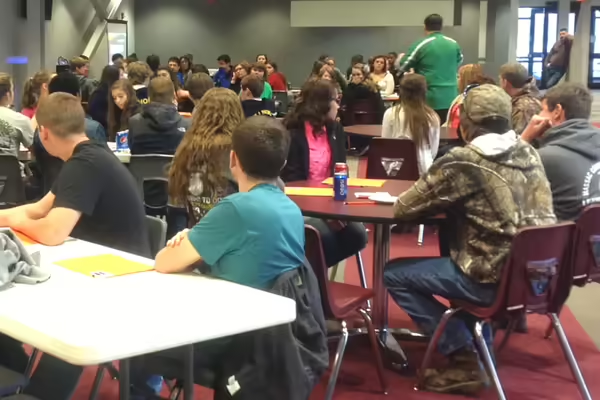
SOUTHERN ILLINOIS – Youth in Southern Illinois got first-hand experience with new technologies, thanks to a program by University of Illinois Extension, in cooperation with partners such as the Champaign-Urbana Community Fab Lab. In addition to learning new technology, nearly 100 teens received training to improve their teaching, organization, and communication skills.
Teens in Alexander, Johnson, Massac, Pulaski and Union counties were trained to deliver technology and nutrition programs to younger peers during the summer. Fifty-one teens taught in May, and another 40 teens volunteered as 4-H teen teachers in June. Teens trained in the Fab Lab were able to use their creative thinking so they could master modern design and fabrication technology. With this training, Extension hosted the mobile Fab Lab at its summer camps so the teen teachers could be mentors and demonstrate the skills they developed in the Fab Lab.
October 2, 50 first-time Teen Teachers were recognized with backpacks as a token of appreciation. Lisa Diaz, Deb Stocker, Robert Smith, and Bill Million from the University of Illinois Extension State 4-H office helped train a new group of 4-H Teen Teachers. With the help of state 4-H staff, students were very pleased and the training was a success. The next Teens as Teachers training will be January 29, 2016.
Illinois 4-H Teen Teachers develop, plan, and select lessons on topics such as STEM, food production, agriculture, and nutrition. 4-H Teen Teachers teach, collaborate, reflect and debrief as a team with their teen teacher partners and an adult mentor. More than 550 Teen Teachers were active in 2015 in Illinois; 43 percent are brand NEW to 4-H, while 43 percent have three or more years 4-H experience.
Over 90% of 4-H teen teachers reported increased confidence, problem solving, teamwork, open mindedness, leadership, and cooperation.
Illinois Extension leads public outreach for University of Illinois by translating research into action plans that allow Illinois families, businesses, and community leaders to solve problems, make informed decisions, and adapt to changes and opportunities.